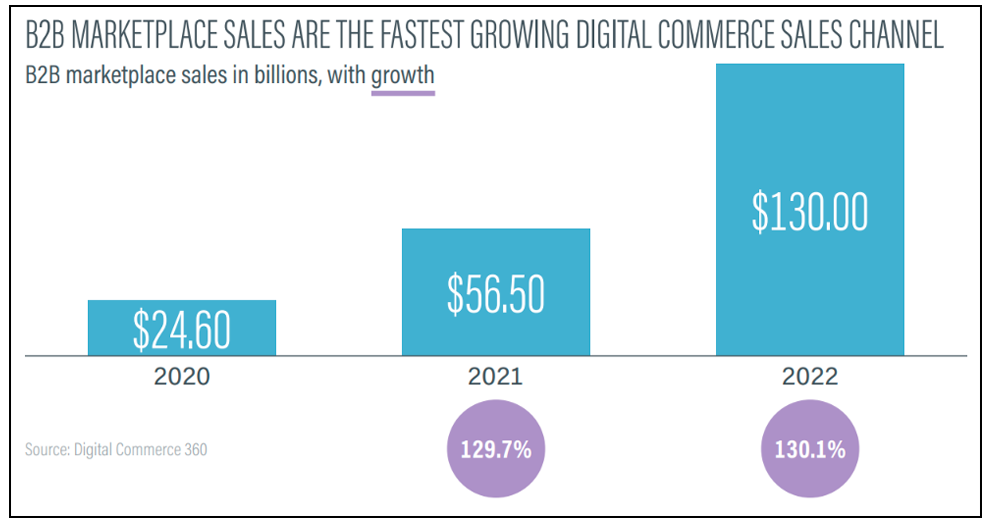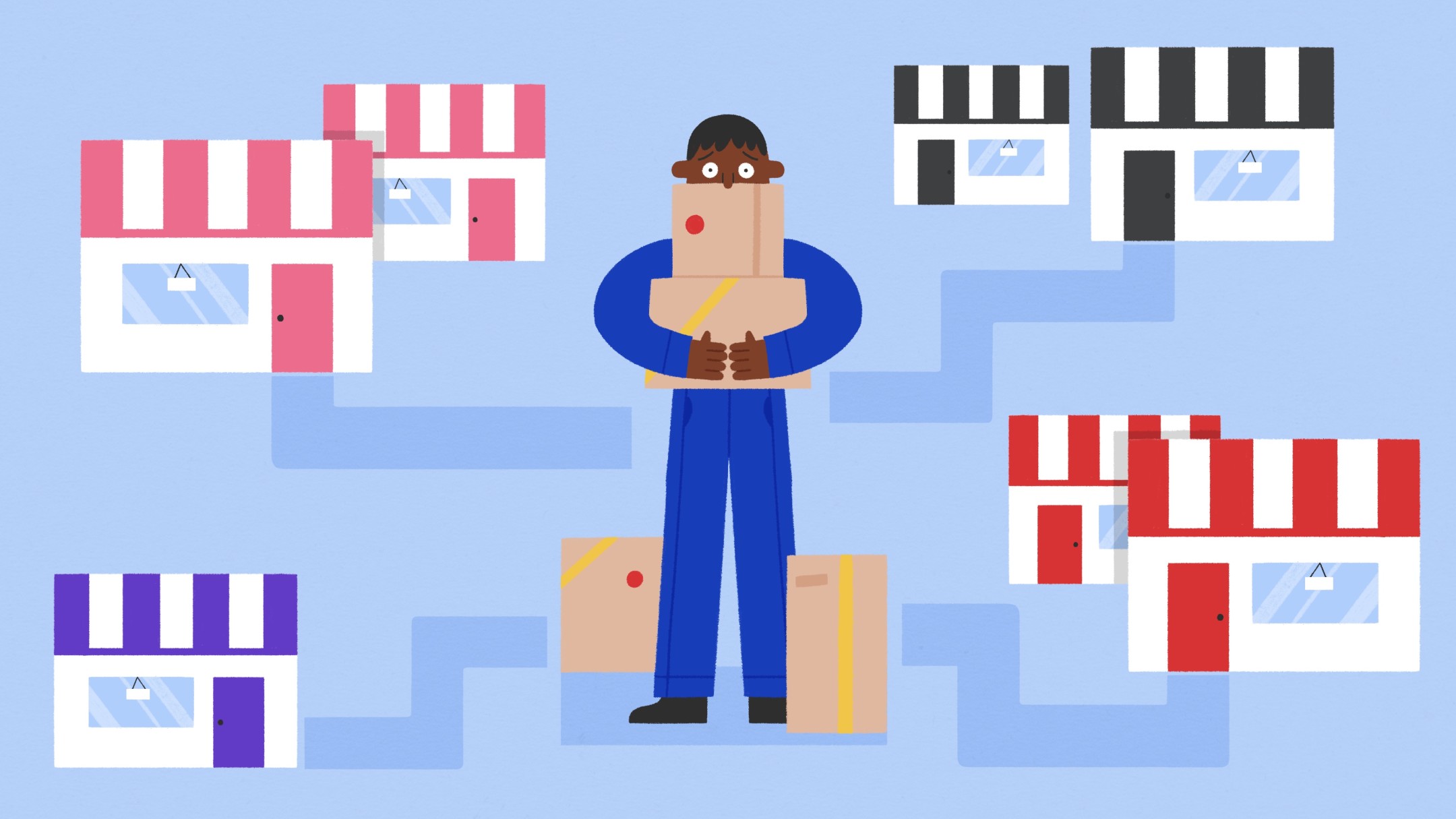Business-to-business (B2B) marketplaces are platforms that connect buyers with retailers. And they’re big business: B2B marketplaces grew 7.2 times faster than allB2B ecommercethis year, after having hit sales of$56 billionin 2021.
The idea sounds promising. List your products on a wholesale marketplace, reach B2B buyers already looking for your products, and generate sales. Sounds simple enough, right?
There’s a lot of careful consideration that goes into B2B marketplaces—from identifying the channels your B2B customers use to whether it’s the right option for your brand in the first place.
This guide helps to dispel the benefits and downsides of a B2B marketplace business model, with nine options to consider as you scale a B2B operation.
Table of contents
- What is a B2B marketplace?
- The benefits of selling through B2B marketplaces
- The downsides of B2B marketplaces
- Top 7 B2B marketplaces to sell online
- How to succeed with B2B ecommerce marketplaces
What is a B2B marketplace?
A B2B marketplace is a platform where businesses sell products to other companies. Those on the buyer’s side use B2B marketplaces for their own business (such as office furniture), or to mark up and resell through their own business.

The benefits of selling through B2B marketplaces
As B2B transitions online, the marketplace model is thriving. Sales on B2B marketplaces are forecast to reach$130 billionin 2022.
Let’s take a look at why so many B2B transactions happen through an online marketplace:
- Lend a marketplace’s reputation.The decision-making process for B2B sales is vastly different from business-to-consumer (B2C). Business buyers need to know they’ll produce a return on their investment when purchasing from you. A marketplace already has their trust, making it easier to convert buyers through the platform.
- Slot into existing purchasing processes.When searching for new products, a B2B marketplace is the first port of call forone-quarter of business buyers. Instead of finding and onboarding new B2B customers manually, upload your inventory to those marketplaces to showcase products where new customers are actively looking for them.
- Expand into new markets.Major B2B marketplaces like Amazon Business and Faire have an existing international presence. Leverage their network, experience, and connections—and sell your products to international buyers—by selling via the marketplace.
- Test and validate new product ideas.Thinking of opening a new product to B2B buyers? Quickly test and validate the idea by listing it for sale on a marketplace. Immediate orders indicate it’s worth investing more resources into expansion.
- Reduce operational costs.Marketplaces offer additional services such as fulfillment,payment processing, andreverse logistics. This reduction in operational costs not only frees up more cash, but time you can invest into activities that don’t scale, such as strengthening B2B customer relationships.
“We sell through Amazon Business and Alibaba because of their established reputation and large customer base. They are well-known platforms with a global reach. We also use them because they offer various support services for wholesalers, such as marketing assistance and payment protection.” —Luke Lee, CEO ofPalaLeather
The downsides of B2B marketplaces
B2B marketplaces offer great advantages to businesses that want to reach more buyers at scale. But before setting up shop on one, consider the disadvantages to marketplace selling:
- Marketplace fees eat into profits.B2B marketplaces take many tasks off your plate—but they charge for the luxury. Many platforms charge for payment processing, sponsored listings that appear higher in searches, and commissions for introducing you to the buyer, which eat into already-tight B2B profit margins.
- B2B marketplaces have strict T&Cs.From restrictions on which products you can upload to the payment terms you can accept, you’re at the mercy of a marketplace’s rules when selling through their platform. Go against these rules and risk having your buyer profile removed.
- Marketplaces own the customer experience.While some B2B marketplaces have functionality to email your customers and improve retention, they act as the middleman. It’s hard to build (and most importantly, maintain) strong relationships with your B2B customers. Those relationships are the foundation of which most profitable B2B ecommerce businesses thrive on.
Top B2B marketplaces to sell online
- Faire
- Amazon Business
- Tundra
- Alibaba
- Ankorstore
- Novi
- Abound
1. Faire
Faireis the leading online wholesale marketplace for independent retailers and brands. Hundreds of thousands of independent retailers shop on Faire for apparel, home decor, food and beverages, beauty and wellness products, jewelry, paper and novelty items, kids and baby merchandise, pet products, and more.
The benefits of Faire’s marketplace:
- Simple set-up. Brands get a free storefront, and there are no set-up costs, subscription fees, or commitments.
- Extended payment terms. Eligible retailers can buy now and pay later with 60-day payment terms.
- Seamless integration. You can instantly sync your orders, inventory, and catalog to your Shopify admin and manage everything from one place.
Considerations when deciding if Faire is right for you:
- There are commission fees on inbound orders placed through the marketplace and some additional fees associated with managing returns. However, you can offset these costs by bringing retailers to the marketplace through Faire Direct—a personalized link that retailers can use to purchase from your shop. When retailers order with your brand on Faire through your Faire Direct link, you’ll pay 0% commission on those orders.
- Faire requires sellers to list their full catalog at the same prices as other wholesale channels. This ensures consistency and builds trust in retailers that shop on the platform.
- If you're deciding whether your products work for wholesale, you’ll also want to consider the cost of goods sold including labor and materials, the profit margin you need relative to the costs of producing them, and the retailer margin needed to sell your products for a reasonable profit (usually around twice the wholesale price).
“The premium nature of many of the Faire retailers that buy our products means we’re reaching potential fans and brand ambassadors.” -Sherry Shannon, Vice President of Sales, Very Great
定价:15%的佣金+市场openi 10美元ob欧宝娱乐app下载地址ng orders, 15% on marketplace reorders, and 0% on Faire Direct orders.
2. Amazon Business
Amazon Business is a platform for buyers to purchase items from other businesses. Mostly used for business-owned purchases (rather than discovering inventory to resell), it’s one of the biggest B2B marketplaces in the world. Amazon Business is forecasted to reach$83 billionin GMV by 2025.
亚马逊业务的优点:
- Reach aglobal audience through the marketplace.
- Low marketing and B2B customer acquisition costs—20% of UK buyersand 15% of US buyers already make purchases through Amazon Business.
- Leverage Amazon’s reputation and supply chain network.
Cons of Amazon Business:
- High level of competition makes it difficult to stand out.
- Lack of control over how you sell and communicate with B2B buyers.
- Limitations over which product categories can be listed on Amazon’s B2B marketplace.
- Some retailers are anti-Amazon and will avoid purchasing from you due to different brand values.
Pricing:$39.99 per month plus referral feesfrom 8%(depending on product category).
3. Tundra
Founded in 2017, Tundra is a relatively new B2B marketplace. Despite its launch coming way after the introduction of ecommerce in B2B, many of the world’s leading brands use Tundra to sell products to B2B customers, including Burt’s Bees, Moleskin, and Candy Club.
Pros of Tundra’s B2B marketplace:
- Tundra integrates with Shopify.
- B2B buyers are screened for fraud before opening an account with Tundra.
- The marketplace handles shipping of large B2B orders, which can save money if you’re shipping large quantities.
Cons of Tundra’s B2B marketplace:
- There are no monthly subscription or commission fees when selling on Tundra.
- Tundra makes its money through shipping and onsite advertising, which means it’ll gatekeep higher visibility for brands that pay.
- Tundra displays businesses more prominently on its marketplace with agold badge. To qualify, you need to offer products for 10% less than any other marketplace or have a minimum order value of less than $50. These can sabotage already-tight wholesale profit margins.
Pricing:Tundra doesn’t charge commission or monthly fees to sell on its marketplace. The platform makes its money through shipping charges and branded advertising.
4. Alibaba
Alibaba is one of theworld’s largestmarketplaces. The Alibaba Group holds several B2B marketplace subsidiaries under its umbrella, including Taobao, Tmall, and AliExpress.
Processing143.2 billion yuan(approximately $20.1 billion) in 2021 alone, brands sell inventory through Alibaba and reach thousands of global retailers who purchase stock through the marketplace.
Pros of Alibaba’s B2B marketplace:
- Alibaba has a global network of retailers using the marketplace to buy inventory.
- Brand profiles need to be verified by Alibaba before they start selling, which builds trust before potential customers view your products.
- Alibaba automatically translates a B2B storefront into 18 different languages to improve accessibility and expand internationally.
Cons of Alibaba’s B2B marketplace:
- Competition is fierce, making it harder to stand out.
- Shipping timescales are longer since most retailers operate in Asia.
- Profit margins and brand equity is lower because products are so similar, forcing brands to compete on price.
Pricing:Alibaba’s standard selling plan costs $3,499 per year and includes $500 in keyword advertising credits. The premium plan costs $6,999 per year, includes $1,150 in keyword advertising credits, and US-based customer support.
5. Ankorstore
Ankorstore is a wholesale marketplace designed to connect independent buyers and sellers in Europe. More than 250,000 retailers use the platform to buy inventory, connecting with over 20,000 brands selling B2B products through its marketplace.
Pros of Ankorstore’s marketplace:
- Offer payment on delivery or 60-day terms to your B2B customers.
- Greater control over wholesale pricing with no restrictions on what inventory needs to sell at.
- Customers and offices across nine European countries including in the UK, Germany, Sweden, and Spain.
Cons of Ankorstore’s marketplace:
- Only brands from Europe can register to sell on Ankorstore.
- The required minimum order value is £100 excluding VAT, which can be off-putting for small businesses or first-time buyers.
- Ankorstore最适合小众品牌和印度pendent retailers, which might not make it a worthwhile option if you’re an established and already well-connected brand.
Pricing:20% commission on opening orders; 10% on orders thereafter. There’s no fee for B2B customers you invite directly to Ankorstore.
6. Novi
Novi is a new B2B marketplace that differentiates itself by focusing on clean, transparent products. The platform verifies marketing claims, formula ownership, and sustainable packing so you can sell to B2B customers that value the same things you do.
Pros of Novi’s B2B marketplace:
- Connect with retailers that share the same core values as you.
- Expand retail distribution by selling to B2B customers whose audience base values the same principles.
- Build trust and credibility around your sustainability claims with Novi’s seal of approval.
Cons of Novi’s B2B marketplace:
- Market size is much smaller than generic B2B marketplaces due to the focus on values.
- You need documentation and evidence to prove any claims are factually accurate.
Pricing: Not shared publicly.
7. Abound
Abound is a wholesale marketplace geared toward indie businesses. Almost6,500 brandscurrently sell 800,000 products on the platform. Popular categories include handmade goods like accessories, jewelry, and stationery.
Pros of Abound’s B2B marketplace:
- There’s no fee to sell through Abound.
- All retailers are verified before joining the platform.
- Showcase your brand values, which B2B buyers can filter when discovering new products.
Cons of Abound’s B2B marketplace:
- It’s tough to start selling on Abound—over70% of brandshave their application rejected.
- Abound leans toward handmade or original products, making it less of a fit for large scale off-the-shelf products.
- There are shipping limitations when selling to customers outside of your own country.
Pricing:There are no monthly subscription fees to start selling on Abound, but commission for each B2B transaction is 15% for first-time orders and 8% thereafter.
How to succeed with B2B ecommerce marketplaces
Deciding to launch a new B2B operation is no small feat. Prepare for your launch and improve the chances of success with these B2B marketplace best practices.
Use real-time inventory management software
WithB2B on Shopify, you’ll benefit from a single ecommerce back end that powers each B2B sales channel. One of the biggest timesavers? A real-timeinventory management systemthat updates automatically across all sales channels. You’ll never sell out-of-stock products on any channel—B2B marketplaces included.
Zac van Manen, digital growth manager atBA Creative说,“一些商家管理不同B2C和B2B inventory so ensuring that these two points of reference are kept both separate and up to date can be tricky.
“Good ERP integrations make this much easier, especially for B2B merchants, but there are considerations to make about which products are sold to which customers—and what this means for your logistics and fulfillment teams.”
AlongsideERP integrations, check that your B2B ecommerce platform offers in-depth analytics to track data across all sales channels. Shopify allows customers to create company profiles for stakeholders to sign in and view past orders, make new ones, and generate invoices—all without interrupting your sales team.
"B2B on Shopify allows us to leverage technology to streamline and automate our wholesale processes, so we can maintain a high level of focus on retail consumers." —Andy Knox,Van Compass
Use a product information management system
B2B customers differ from B2C in the fact they demand more knowledge from the brands they buy from. That becomes tricky once you’re working with a large number of SKUs across multiple sales channels. Information quickly becomes outdated. B2B buyers on the marketplace opt for a retailer that provides accurate information.
Easily manage a distributed product catalog with aproduct information management(PIM) system. It’s a software that helps keep things consistent across wholesale marketplaces and your B2B online storefront by storing and syncing the following data:
- SKU numbers
- Product titles, images, and descriptions
- Product tags and categories
- Wholesale and tiered pricing structures
- Minimum order values for B2B orders
Apps likeJasper PIMintegrate with your Shopify Plus store. It offers automation features to automatically syndicate new inventory across each B2B marketplace you’re operating on. These workflows ensure B2B customers encounter accurate information regardless of where they place their order.

Outsource order fulfillment
You’ve done the hard task of converting a B2B marketplace buyer into a customer of your business. Next, you’ll need to deliver those products to buyers as quickly and accurately as possible.
Fulfilling B2B orders is vastly different from DTC because buyers make larger orders. Instead of shipping a single unit to a customer, you’re shipping items in bulk—sometimes more than 100 units—through a B2B marketplace transaction.
Andreas Blomst, general manager orExtensiv, predicts outsourced order fulfillment to be a growing trend in the B2B industry. He says, “In 2023, I predict increased outsourcing of fulfillment services to 3PLs. This system allows for brands to benefit from fulfillment expertise and distributed inventory without the overhead. It lets the brands focus more on sales and digital marketing.”
Outsource the B2B order fulfillment with athird-party logistics (3PL) providersuch as:
Similarly, check whether the B2B marketplaces you’re selling on offer a fulfillment service. Amazon Business, for example, offersFulfilled by Amazon. Ship a portion of your inventory to one of Amazon’s warehouses, where its team will pick, pack, and ship orders made through the B2B marketplace.
The advantage of using your marketplace’s distribution network is that you can lend its existing supply chain. Frominternational warehousesto advanced fulfillment technologies, you’ll get products to your B2B customers faster. Meeting those delivery expectations is much more likely to result in B2B customer retention.
Better order management tools that sit between the ordering platform and the warehouse will become commonplace to provide order fulfillment routing to the best location with available inventory, allowing businesses to deliver wholesale orders as efficiently as their B2C orders.”
—Andreas Blomst, general manager of Extensiv
Start selling on B2B marketplaces
There’s no doubt that marketplaces are valuable sales channels for B2B organizations. Reach millions of buyers using wholesale marketplaces to source inventory for their own business, without the pressure of attracting B2B customers individually.
Make your B2B marketplace operation a success with Shopify’s B2B platform. Manage inventory, product information, and sales analytics from one dashboard, regardless of where you’re selling.
B2B marketplace FAQ
What are wholesale marketplaces?
A wholesale marketplace is a platform for retailers to purchase products from other brands at a discounted price, in bulk.
What is the best B2B marketplace?
Alibaba is one of the best B2B marketplaces to sell inventory to other businesses in bulk. If you’re looking to sell handmade or artisan products through a marketplace, Faire is the better option.
What is an example of a B2B marketplace?
There are plenty of B2B marketplaces to sell on. Popular B2B marketplaces include Handshake, Faire, and Abound.
What is the difference between a B2B and a B2C marketplace?
Individual customers purchase from B2C marketplaces like Amazon and Etsy. On a B2B marketplace platform, however, retailers purchase from other businesses. Products are sold at lower prices, in bulk. Unlike B2C platforms, customers often need to be approved before they can see wholesale prices on a B2B marketplace.
Read More
- B2B Ecommerce: Everything You Need to Know to Get Started
- B2B Ecommerce: Why Taking Your B2B Business Online is a Smart Strategy to Scale
- 12 B2B Ecommerce Trends To Shape Your Business in 2023
- What Is Wholesale B2B and How To Sell To Customers in 2023
- B2B支付什么?方法与处理系统s
- Find the perfect domain name
- Website Builder 2023: Create a Website in Minutes






